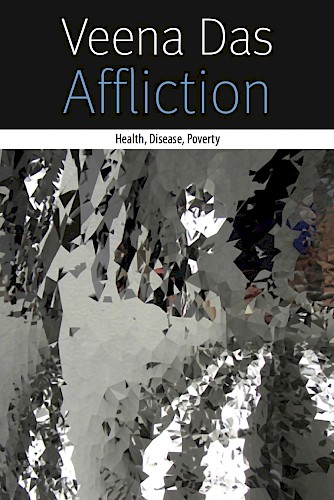Introducing Veena Das and her interlocutors on 'Affliction: Health, Disease, Poverty'
—
This forum on Veena Das’s book Affliction: Health, Disease, Poverty (Fordham, 2015) brings together three anthropologists (one each from the United States, France, and Switzerland) and three teams of psychiatrists from the premiere research hospital (All India Institute of Medical Sciences [AIIMS]) to reflect on how Affliction has served as a provocation to their own research and practice. Bhrigupati Singh, a cultural anthropologist from Brown University who was a visiting professor at AIIMS in 2015, provides a lively account of the conversation that took place between the teams of psychiatrists and Das in the seminar room of AIIMS in February 2016, from which their commentaries grew. Das provides a thoughtful reflection that is not so much a defense of her book as it is a confrontation with her own uncertainties and what one might call the ‘difficulties of reality’ in combining research and advocacy as necessary conditions for each other.
Affliction may well represent a moment in anthropology when, instead of tightening the boundaries between different subfields such as medical anthropology and anthropology of religion, the imperative is to open up these subfields. The individuals who inhabit the pages of Affliction are not seen as simply patients who are encountered in the clinic, nor are the healers defined primarily as bearers of expert knowledge. Similarly, the book engages with a range of concepts from philosophy, anthropology, religious history, economic theory, and theoretical medicine, and it finds the conversations enabled by crossing these boundaries to be relevant for addressing the most urgent issues of health care reform in situations of constrained resources.
How does a book that defies allegiance to any single set of theoretical and methodological imperatives find a place among contemporary theories of health and disease? The commentaries in this special section give us several clues about what might be at stake in an ethnography that deepens connections between anthropology and literature while also using statistical methods, surveys, measuring, and counting – all those activities anthropologists habitually criticize as ‘dehumanizing’. This eclecticism allows followers of different persuasions to recognize their own concerns (Richard Rechtman’s contribution to this collection, for instance, recognizes literary analogies, while Koushik Sinha Deb and Swarndeep Singh’s recognizes the methods of epidemiological psychiatry), while attention remains focused on abstract questions of whether suffering or happiness is to be prioritized.
Despite differences in rhetorical style, the commentaries gathered here allow us to dwell on overlapping issues that emerge from a discussion of Affliction. First, there is the question of how to think of illness as dispersed across many sites, among which the clinic is but one. This raises important questions not only for medical anthropology but also for anthropological theory more generally: What is the appropriate scale for observing relations? Is it the family, the neighborhood, or the city, and are these entities simply smaller and larger or do they present different possibilities for seeing emergent social life? Second, how is one to conceptualize normality and pathology? While objects may stand out, given their continuity over time or their sharp boundaries, what about events, such as a disease event? Do we know what it is to define the different points of diagnosis and treatment in a disease event, or, most importantly, what we mean by a ‘cure’? Third, what happens to classical genres such as the illness narrative when ethnography is attuned not necessarily to plot lines and characters but to catching the echoes of suffering? And finally – though this does not indicate an exhaustive listing of the concerns raised – when we recognize that suffering may be ordinary and routine, and may not produce heroes and villains, what form should criticism take?
The commentaries show the open character of the arguments in Affliction. Das’s response is to acknowledge the different obstacles and the small and large failures she encountered in pursuing research that includes advocacy. Above all it also shows that even in the scenes of rage, disappointment, and grief that she depicts, she can participate with a degree of joy, doing what Bhrigupati Singh and Jane Guyer (2016) elsewhere define as doing ‘joyful anthropology’ even as one is destined, like the reluctant healer in one of Das’s chapters, to live both actually and in the subjunctive mode.
I hope readers will find their own ways of taking these provocations further in their own research, in their advocacy for causes dear to them, and in their practice.
About the author
Clara Han is Associate Professor in the Department of Anthropology at Johns Hopkins University. She is the author of Life in Debt: Times of Care and Violence in Neoliberal Chile (University of California Press, 2012) and the co-editor with Veena Das of the volume Living and Dying in the Contemporary World: A Compendium (University of California Press, 2015).
Reference
Singh, Bhrigupati, and Jane Guyer. 2016. ‘Introduction: A Joyful History of Anthropology’. HAU: Journal of Ethnographic Theory 6, no. 2: 197–211. https://dx.doi.org/10.14318/hau6.2.
